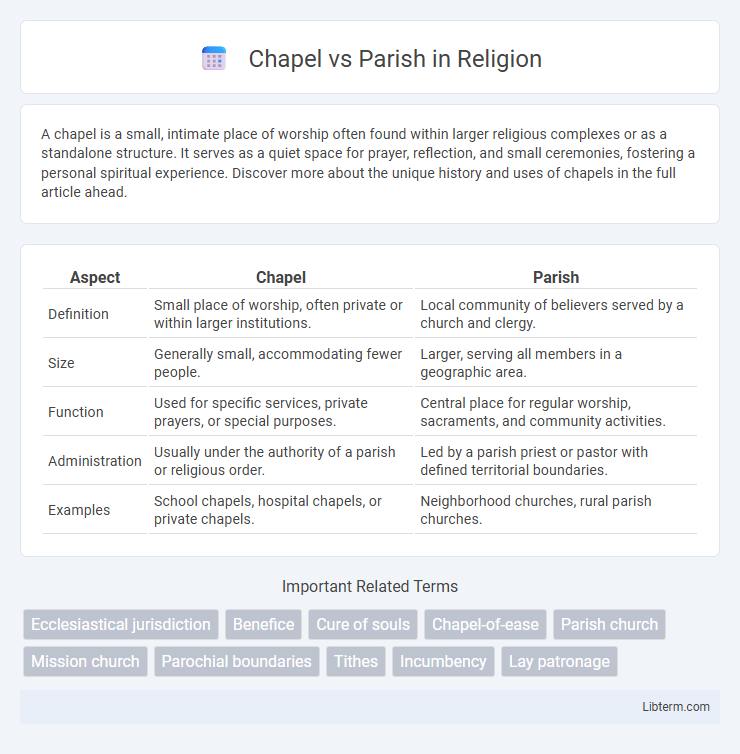A chapel is a small, intimate place of worship often found within larger religious complexes or as a standalone structure. It serves as a quiet space for prayer, reflection, and small ceremonies, fostering a personal spiritual experience. Discover more about the unique history and uses of chapels in the full article ahead.
Table of Comparison
| Aspect | Chapel | Parish |
|---|---|---|
| Definition | Small place of worship, often private or within larger institutions. | Local community of believers served by a church and clergy. |
| Size | Generally small, accommodating fewer people. | Larger, serving all members in a geographic area. |
| Function | Used for specific services, private prayers, or special purposes. | Central place for regular worship, sacraments, and community activities. |
| Administration | Usually under the authority of a parish or religious order. | Led by a parish priest or pastor with defined territorial boundaries. |
| Examples | School chapels, hospital chapels, or private chapels. | Neighborhood churches, rural parish churches. |
Introduction: Understanding Chapel vs Parish
A chapel is typically a smaller worship space, often found within larger institutions such as schools, hospitals, or private estates, designed for intimate religious services. A parish refers to a defined geographic area with a local church that serves as the central place of worship for its community and is often governed by a parish priest or pastor. Understanding the distinction between chapel and parish highlights their roles in organizational structure and community engagement within various Christian traditions.
Definition of Chapel
A chapel is a small place of worship that may exist within a larger church, institution, or private property, designed for more intimate or specific religious services. Unlike a parish, which is an administrative district with a designated congregation and clergy, a chapel does not typically serve as the central hub for community worship or governance. Chapels often function as auxiliary spaces for prayer, ceremonies, or devotion, without the full organizational structure of a parish.
Definition of Parish
A parish is a defined territorial entity within a diocese with its own church and a resident priest responsible for the pastoral care and administration of the community. Unlike a chapel, which may serve specific functions or smaller groups, a parish functions as the basic unit of ecclesiastical organization with formal governance and sacramental responsibilities. The parish fosters regular worship, community activities, and the spiritual development of its members under canonical jurisdiction.
Historical Origins of Chapels and Parishes
Chapels historically originated as small, private places of worship often attached to large estates or institutions, serving specific groups or families without the full administrative functions of a parish church. Parishes date back to the early Christian church, evolving as ecclesiastical districts with established territorial boundaries and a resident cleric responsible for the spiritual care of the entire community. The development of parishes was instrumental in organizing medieval society around localized church governance, while chapels remained auxiliary worship spaces with limited jurisdiction.
Differences in Religious Functions
A chapel typically serves as a smaller, private place of worship often attached to institutions like schools, hospitals, or private estates, whereas a parish functions as a local community of believers under the care of a parish priest within a defined geographic area. Parishes provide regular public services, sacraments, and community activities central to the spiritual life and pastoral care of its members. In contrast, chapels usually hold specialized or occasional services without the full administrative structure and community responsibilities found in parishes.
Governance and Administration
A parish is a territorial unit with a defined congregation governed by a parish council or vestry, responsible for administrative decisions, financial management, and pastoral care. A chapel typically operates under the jurisdiction of a parent parish or diocese, lacking independent governance and relying on external authorities for administration and decision-making. The governance structure of a parish offers more autonomy and local control compared to a chapel, which serves as a subsidiary worship site without separate administrative functions.
Physical Structure and Location
A chapel is typically a smaller, often standalone or attached structure used for worship, located within larger institutions like schools, hospitals, or private estates. A parish is centered around a main church building serving a specific geographic area or community, often featuring more extensive facilities to accommodate parishioners. The physical scale and permanence of a parish church distinguish it from the more modest and sometimes temporary nature of chapels.
Community and Membership
A chapel often serves a smaller, more intimate community, frequently functioning within a larger parish or institution, providing a gathering place for worship and specific ceremonies. Parish membership involves a defined territorial congregation with established boundaries, where members actively participate in communal religious, social, and charitable activities, fostering a stronger sense of local identity and support. Churches designated as parishes typically maintain organized membership rolls, sacramental records, and structured pastoral care, emphasizing a more sustained and engaged community life.
Worship Services and Activities
Chapel worship services typically feature smaller, more intimate gatherings often centered around specific groups such as schools, hospitals, or private institutions, emphasizing personalized liturgy and community involvement. Parish churches conduct regular public worship services with a broader congregation, including Sunday Mass, sacraments, religious education, and diverse community activities aimed at fostering spiritual growth and social outreach. The scope of activities in parishes usually extends to organized ministries, youth groups, and charitable programs, reflecting their role as focal points for local faith communities.
Key Similarities and Distinctions
A chapel is typically a smaller, private place of worship that may serve a specific group or institution, whereas a parish is a defined territorial entity within a diocese with a resident priest serving a broader community. Both chapels and parishes conduct regular religious services and sacraments, but parishes generally have a more structured administrative role and greater responsibilities in pastoral care. The distinction lies in scale, governance, and community scope, with chapels often being subordinate or supplemental to a parish.
Chapel Infographic

 libterm.com
libterm.com